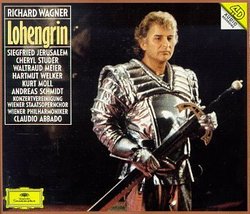| All Artists: Richard [Classical] Wagner, Claudio Abbado, Vienna Philharmonic Orchestra, Vienna State Opera Concert Chorus, Cheryl Studer, Amy-Linda Domaracki, Andreas Schmidt, Bojidar Nikolov, Claudio Otelli, Elisabeth Mach, Franz Kasemann, Gretchen Eder, Hartmut Welker, Ingrid Sieghart, Kurt Moll, Marianne Sattmann, Peter Koves, Renate Hasler, Senta Fischer, Siegfried Jerusalem Title: Wagner: Lohengrin Members Wishing: 1 Total Copies: 0 Label: Dg Imports Release Date: 1/17/1995 Album Type: Import Genre: Classical Style: Opera & Classical Vocal Number of Discs: 3 SwapaCD Credits: 3 UPC: 028943780827 |
Search - Richard [Classical] Wagner, Claudio Abbado, Vienna Philharmonic Orchestra :: Wagner: Lohengrin
 | Richard [Classical] Wagner, Claudio Abbado, Vienna Philharmonic Orchestra Wagner: Lohengrin Genre: Classical
|
Larger Image |
CD Details |
CD ReviewsExcellent Wagner 07/08/1999 (5 out of 5 stars) "This is a beautiful modern recording of one of Wagner's most accessible works. Abbado, famous for his Verdi conducting, directs a strong, passionate performance. Siegfried Jerusalem may lack the tonal beauty of Domingo in this role, but he pays more attention to the text and is willing to carefully shade his voice in the more introspective moments. Cheryl Studer is a radiant Elsa, her reedy tone projecting both innocence and goodness. She is not quite as dramatically aware as she was on her earlier live recording from Bayreuth, but her singing is even more beautiful here. Waltraud Meier sings a stupendous Ortrud, bringing both beauty of tone and sensuality to a role normal sung by roaring harpies. Many people claim the Solti recording of this opera as the best, but I prefer this one for its beauty and simplicity." Praise for Waltraud Meier 02/16/2000 (4 out of 5 stars) "This recording is quite good, if perhaps rather main-stream. There are no real flaws, but maybe the performance is too polished. The reason you should get this recording - and you should, definitely - is Waltraud Meier: she is a riveting Ortrud, combining her wonderful, sensous voice with a stunning dramatic presence. If I were to choose with which of the two female protagonists of the opera to spend a night on the town with, I'd not opt for the heroïne, but for the witch!" Surprise--the best Lohengrin is from a Wagner newbie Santa Fe Listener | Santa Fe, NM USA | 09/05/2005 (5 out of 5 stars) "I really admire this set as a dramatically convincing performance with idiomatic singing throughout. It wasn't lucky on its release date, which was too close to the Colin Davis set on RCA and overshadowed by the stellar set with Domingo and Jessye Norman under Solti on London/Decca. But the Davis is ruined by Sharon Sweet as a blowzy, unsteady Elsa, despite the excellent Ben Heppner in the title role (RCA has wisely issued an excerpts CD called 'Heppner Sings Lohengrin'). The Solti is spectacular, but Domngo isn't exactly born to the German singing style, and Norman is twice the voice her part needs.
I therefore pick the Abbado for its overall musical excellence. Siegfried Jerusalem is a terrific, intelligent Lohengrin who was unfortunatley caught just past his prime. Cheryl Studer's Elsa is the best since Grummer on the classic Kempe set, and I think better. Abbado conducts with great musicality and feeling for the opera, despite never having conducted Wagner in the pit before this. The orchestra and chorus are glorious, and the sound is surpassed only by the spectacular Solti. What's not to love? P. S. August, 2009 -- As an addendum to the above, I am adding my review of a 1959 Lohengrin from Bayreuth that feels like an answered prayer, since it features Konya with an excellent conductor. I've also heard the Kubelik, which despite its devoted fans, is crippled for me by James King's blatant, uninflected singing that carries little musical interest. Here's the Bayreuth review: By consensus the Fifties was a Golden Age for opera, and this 1959 Lohengrin from Bayreuth could be offered as prime testimony. I have little to add to the unstinting praise given below. Every role is filled almost ideally -- the Herald of Eberhard Waechter is as world-class as the King or Telramund. One advantage of a festival is that star casting can be lavished throughout. Grummer had already established herself as the major Elsa in Germany, and every opera house in the world clamored for the sweet-toned Sandor Konya, with his miraculous blend of lyrical beauty and power. In Wagner we haven't seen his like since, excepting only Ben Heppner. Having gone back to the original Bavarian Radio tapes, Orfeo's sonics are exceptional; they have also remastered them to eliminate microphone distortion and hiss. The Bayreuth orchestra sounds a tad boxy and muffled, but the voices are up close and well captured. The overall effect is like hearing a superb FM braodcast. There are few stage noises (Wieland Wagner's abstract production featured no stage sets or machinery). Fanciers of the opera won't hesitate to buy this set, despite the absence of libretto and the most tedious, long-winded liner notes imaginable. Given all its merits, is this the best Lohengrin on records? Vocally, the answer is yes. But expert as he is, von Matacic doesn't conduct with inspiration. Solti and Abbado both exhibit greater dramatic tension and musical variety. In turn, they bring out more vivid characterizations from their lead singers than is heard here. And modern stereo far outshines dated mono, of course. But these are quibbles. Any Lohengrin featuring Konya is well worth hearing. Among the three or four now available (including a tempting RCA Living Stereo version under Leinsdorf from Boston that turns out to have both dismal conducting and a rock-bottom Elsa) this one is first choice. It's a must-listen for anyone who loves the oper " |

 Track Listings (15) - Disc #1
Track Listings (15) - Disc #1